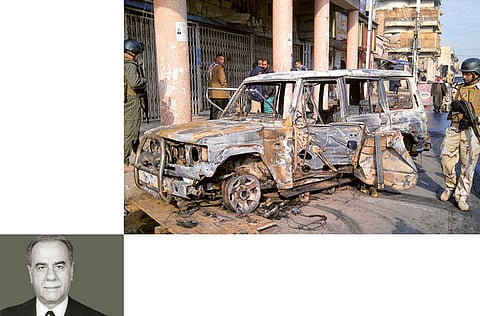Iraq’s security failure
The quota policy has left huge loopholes in the body politic, from where those who want to harm the country can easily creep through

Twenty-eight terrorist attacks, car bomb explosions and automatic rifle fire rocked Baghdad and other locations around Iraq recently, deepening the wounds of the country.
Over 250 innocent people were either killed or injured during the latest terrorist attacks which took place in 11 cities around the country. In Baghdad alone five mega blasts took place claiming the lives of security personnel.
These attacks are considered the bloodiest since those that struck 17 different locations around the country in August and were claimed by the Islamic State of Iraq, which is affiliated to Al Qaida in Iraq.
Almost six months of agony separated these two series of blasts, and between them hundreds of smaller terrorist acts were carried out in different Iraqi cities leading to additional chaos and mayhem.
The massive attacks which took place on February 23 — which may well recur today or tomorrow or the day after — require to be analysed and observed closely.
Most of the official statements are unconvincing and it is common knowledge that they are made to absorb people’s anger and to evade responsibility.
The spokesman of the Ministry of Interior announced that the ministry possesses grave and important information regarding the blasts. He then proceeded to threaten all those who have carried out the terrorist operations — but if the ministry was truly in possession of information, why are the culprits still at large?
And at a time when a senior security official announced that Al Qaida’s dominance has receded in Iraq because its fighters and leaders have left for Syria, Yemen and other locations, Iraqi streets are smeared with the blood of its people, revealing the shallowness of such hideous statements.
The explosions which took place recently were not mere security breaches as we have become accustomed to hearing from security officials. In all truth it is a grave security failure.
The country’s security has local and regional aspects, and it is the most important issue in setting up strategies and laying down policies.
The worrisome security issue in Iraq over the past nine years is related to its stability and in reality it is a political rather than a security issue.
By the end of the day, those responsible for the country and its people’s security are the government, with its constitution, premier and establishments.
All the country’s resources and 2012 budget — the largest in Iraq’s history, exceeding $100 billion — are at the government’s disposal. Under its disposal are also Iraq’s human resources in government establishments and civil organisations.
The government is also able to make use of the abilities of tens of thousands of Iraqis working abroad in political organisations or other establishments. Those people will never refuse to serve their country.
The government also has a complete free hand in directing and employing resources in the development plan according to its programmes approved by the parliament.
On the other hand, the forces of darkness do not have the same financial and human resources, and no matter what they have, it will remain minute.
These people work in secret locations that force certain communication restrictions, whether in connecting with others or gaining intelligence information and materials that assist them in carrying out their schemes.
The failure of government’s security despite its huge abilities and resources and the success of the terrorists despite their limited abilities is due to the way each of them utilises its resources.
Although the government has so many resources, it is unable to employ them appropriately.
One of the most prominent elements of institutional success — whether government or private — is the existence of a clear philosophy and a vision which serves it along with a long-term strategy to transform this vision into reality.
That which applies to establishments and institutions can also be applied to the state itself.
However, it is difficult to apply any sort of strategy in Iraq because the state lacks scientific planning and specialised and honest work teams.
The deformed political process in Iraq, which was built on sectarian quotas, has killed all hopes of success in re-building Iraq along modern lines.
This has also deprived Iraq of making use of its experts, as leading and minor positions in the government are distributed through political deals between those who took over decision-making in Iraq, while coordinating on monopolising Iraq’s resources and the protection of the corrupt.
The political quota policy has left huge loopholes and openings in the body politic, where those who want to harm Iraq can easily creep through.
One last word to those in charge of security in Iraq: that which you call a security breach is in fact a political failure in every aspect.
Dr Mohammad Akef Jamal is an Iraqi writer based in Dubai.



